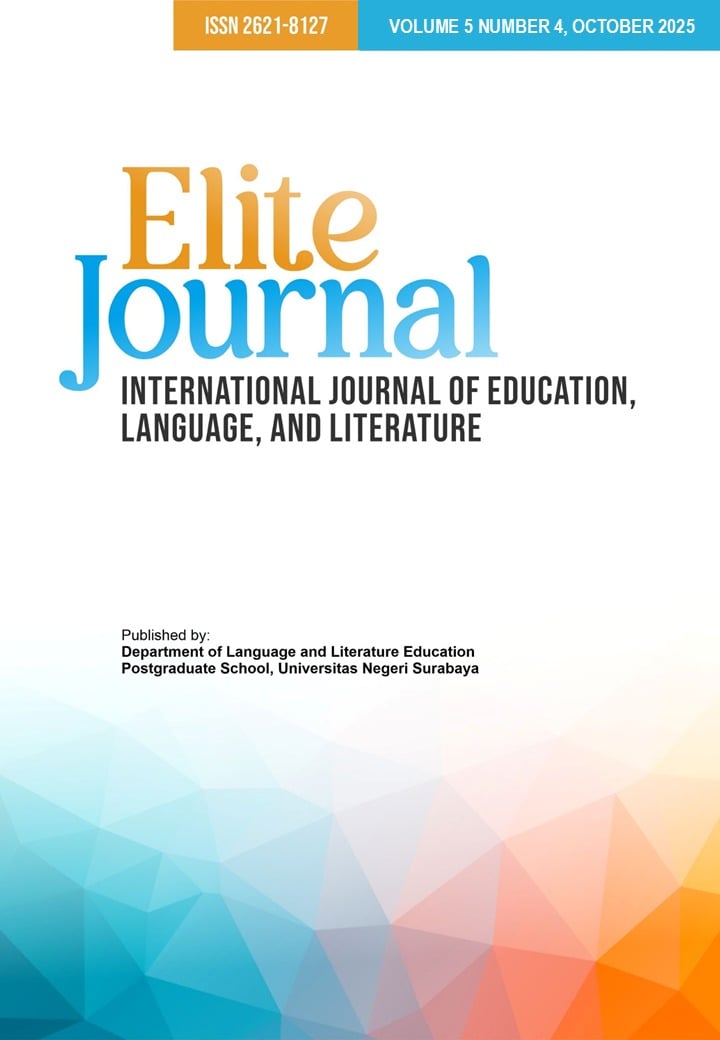EVELYN’S ARCHETYPES IN REID’S THE SEVEN HUSBANDS OF EVELYN HUGO
DOI:
https://doi.org/10.26740/elitejournal.v5n4.p1-17Keywords:
Archetype, Collective Unconscious, PersonalityAbstract
Personality is inherently adaptive, often shifting in response to environmental demands to meet expectations, gain recognition, and ensure survival. This concept is illustrated through the character of Evelyn Hugo, a Hollywood actress whose life is fraught with drama and controversy, in Taylor Jenkins Reid’s The Seven Husbands of Evelyn Hugo. This study adopts a psychoanalytic approach grounded in Carl Jung’s theory of the collective unconscious to examine how archetypes are represented in Evelyn’s character. It further investigates the extent to which her past experiences shape the emergence of these archetypes. The analysis draws upon selected dialogues, monologues, and narrative elements that align with the study’s objectives. The findings reveal that Evelyn’s personality is expressed through four major Jungian archetypes: persona, shadow, animus, and self, all of which are significantly influenced by her psychological trauma and formative life experiences.
References
Damayanti, A. P. (2023). The Portrayal of Women Oppression in Reid’s The Seven Husbands of Evelyn Hugo. Undergraduate Thesis, Universitas Islam Negeri Maulana Malik Ibrahim. http://etheses.uin-malang.ac.id/54765/
Hull, R. F. C. (1975). The Structure & Dynamics of the Psyche (The Collected Works of C. G. Jung) (S. H. Read, M. Fordham, G. Adler, & W. McGuire, Eds.; 2nd ed., Vol. 8). Princeton University Press.
Jung, C. G. (1959). The Basic Writings of C.G. Jung (V. S. DeLaszlo, Ed.). New York, NY: Random House.
Jung, C. G. (1969). The Archetypes and The Collective Unconscious (The Collected Works of C. G. Jung) (S. H. Read, M. Fordham, G. Adler, & W. McGuire, Eds.; 2nd ed., Vol. 9). Princeton University Press.
Karakaş, Ü., & Karaaziz, M. (2024). Carl Gustav Jung’s Concept of Collective Unconsious and Archetype. Vision International Refereed Scientific Journal, 9(2), 77–85. https://doi.org/10.55843/ivisum2493077k
Leigh, D. J. (2011). Carl Jung’s Archetypal Psychology, Literature, and Ultimate Meaning. Ultimate Reality and Meaning, 34(1–2), 95–112. https://doi.org/10.3138/uram.34.1-2.95
Lotta, M. (2024). Behind the Glitter - Fabricated History and Problems of Stardom in Taylor Jenkins Reid’s The Seven Husbands of Evelyn Hugo. Master Thesis, University of Eastern Finland. https://erepo.uef.fi/bitstream/handle/123456789/33102/urn_nbn_fi_uef-20241572.pdf?sequence=1
Reid, T. J. (2017). The Seven Husbands of Evelyn Hugo. New York, United States. Atria Books.
Suksmana, R. I. (2013). Roderick’s Persona and Shadow Represented in Edgar Allan Poe’s The Fall of the House of Usher based on Carl Jung’s Archetypes Characters. Undergraduate Thesis, Universitas Brawijaya. http://repository.ub.ac.id/id/eprint/100755
Wagner, M. H. (2023). Exploring Intersectionality in Taylor Jenkins Reid’s The Seven Husbands of Evelyn Hugo: Age, Ethnicity, Gender, Sexuality, and Class in a Hollywood Icon’s Life Story. Master Thesis, University of Graz. urn:nbn:at:at-ubg:1-193907
Downloads
Published
How to Cite
Issue
Section
License
Copyright (c) 2025 Ratri Candra Prameswari

This work is licensed under a Creative Commons Attribution 4.0 International License.
 Abstract views: 134
,
Abstract views: 134
, PDF Downloads: 111
PDF Downloads: 111





